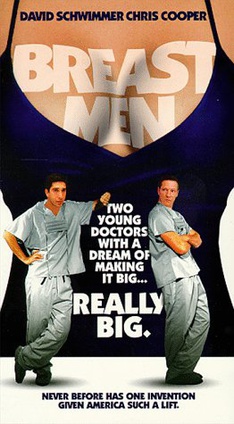Breast Men
Breast Men is a 1997 American drama film directed by Lawrence O'Neil that explores the history of breast implants and the rise of breast augmentation surgery in the United States. The film is a semi-biographical account focusing on the lives and careers of two plastic surgeons, Dr. Kevin Saunders and Dr. William Larson, who are credited with the development of the modern breast implant. These characters are fictionalized versions of real-life figures Dr. Frank Gerow and Dr. Thomas Cronin, the actual inventors of the first silicone breast implants in the 1960s. Breast Men delves into the ethical, medical, and social implications of plastic surgery, highlighting the personal and professional challenges faced by its protagonists.
Plot[edit | edit source]
The narrative of Breast Men follows the ambitious young surgeons Saunders and Larson from their initial inspiration to create a breast implant to their rise to fame and subsequent fall. The film begins in the 1960s, showcasing their groundbreaking development of silicone breast implants and the first successful augmentation surgeries. As their invention gains popularity, both doctors enjoy financial success and celebrity status. However, the story also uncovers the darker side of their success, including the scrutiny and lawsuits from patients experiencing complications from the implants. The film portrays the impact of their work on their personal lives and the lives of their patients, culminating in a reflection on the societal obsession with body image and the consequences of medical innovation without thorough understanding of long-term effects.
Cast[edit | edit source]
- Chris Cooper as Dr. Kevin Saunders
- David Schwimmer as Dr. William Larson
- Emily Procter as Laura Pierson
- Matt Frewer as Gerald Krzemien
Themes[edit | edit source]
Breast Men addresses several themes, including the ethics of plastic surgery, the impact of medical innovations on society, and the complexities of the doctor-patient relationship. It critically examines the American cultural obsession with physical appearance and the lengths to which individuals will go to achieve perceived physical perfection. The film also explores the consequences of unchecked ambition and the potential harm that can result from medical procedures when long-term effects are not fully understood.
Reception[edit | edit source]
Upon its release, Breast Men received mixed reviews from critics. Some praised the film for its insightful look into the plastic surgery industry and its impact on American culture, while others criticized it for sensationalizing the subject matter. Despite the mixed critical reception, the film has been noted for its performances, particularly those of Cooper and Schwimmer, and its contribution to discussions about body image and medical ethics.
Impact[edit | edit source]
Breast Men has contributed to the ongoing debate about breast augmentation and plastic surgery more broadly. It has been used as a reference in discussions about the ethics of cosmetic surgery, the responsibility of surgeons to their patients, and the societal pressures that drive individuals to alter their bodies. The film serves as a cautionary tale about the potential risks associated with medical innovations, especially when they are driven by profit and vanity rather than patient health and well-being.
Search WikiMD
Ad.Tired of being Overweight? Try W8MD's physician weight loss program.
Semaglutide (Ozempic / Wegovy and Tirzepatide (Mounjaro / Zepbound) available.
Advertise on WikiMD
|
WikiMD's Wellness Encyclopedia |
| Let Food Be Thy Medicine Medicine Thy Food - Hippocrates |
Translate this page: - East Asian
中文,
日本,
한국어,
South Asian
हिन्दी,
தமிழ்,
తెలుగు,
Urdu,
ಕನ್ನಡ,
Southeast Asian
Indonesian,
Vietnamese,
Thai,
မြန်မာဘာသာ,
বাংলা
European
español,
Deutsch,
français,
Greek,
português do Brasil,
polski,
română,
русский,
Nederlands,
norsk,
svenska,
suomi,
Italian
Middle Eastern & African
عربى,
Turkish,
Persian,
Hebrew,
Afrikaans,
isiZulu,
Kiswahili,
Other
Bulgarian,
Hungarian,
Czech,
Swedish,
മലയാളം,
मराठी,
ਪੰਜਾਬੀ,
ગુજરાતી,
Portuguese,
Ukrainian
Medical Disclaimer: WikiMD is not a substitute for professional medical advice. The information on WikiMD is provided as an information resource only, may be incorrect, outdated or misleading, and is not to be used or relied on for any diagnostic or treatment purposes. Please consult your health care provider before making any healthcare decisions or for guidance about a specific medical condition. WikiMD expressly disclaims responsibility, and shall have no liability, for any damages, loss, injury, or liability whatsoever suffered as a result of your reliance on the information contained in this site. By visiting this site you agree to the foregoing terms and conditions, which may from time to time be changed or supplemented by WikiMD. If you do not agree to the foregoing terms and conditions, you should not enter or use this site. See full disclaimer.
Credits:Most images are courtesy of Wikimedia commons, and templates, categories Wikipedia, licensed under CC BY SA or similar.
Contributors: Prab R. Tumpati, MD

